Winning a title is one thing, winning six in a row is another, and achieving consecutive titles in an unbeaten way is a whole different ball game. While Birkirkara’s unbeaten streak came to an end at 92 matches, with a heartbreaking injury-time goal, what remains is not just a record, not just a target for others to aim for, but a legacy of the winning mentality needed to achieve such lasting dominance.
The statistics make for impressive reading. However, behind those numbers is a lot of work done in the shadows, by those building and nurturing the squad to create that winning team. Ultimately, there are the crucial moments where the team steps up on the pitch to deliver and overcomes the challenge.
Encapsulating all the work done across seven seasons in a single article is an impossible task, but one hopes that the below gives a taste of the trials and tribulations to achieve the historic feat.
The Beginning of Something Special
For an unbeaten streak to begin, there must first be a defeat. The last team to beat Birkirkara in the league, prior to the start of the streak, was Hibernians. The villain that day was Ylenia Carabott on the 21st of March, 2018. She would eventually go on to play for the side during the unbeaten streak as well. Ironically, the Stripes’ opening win of the streak was one of the easiest one they got, a walk-over on Tarxien Rainbows in the next fixture. However, the team backed it up with wins over Kirkop United, Raiders Luxol and Mgarr United.
At that point, the Stripes headed into the final match of the season, which pitted them against rivals Hibernians once more. They ended it with revenge, a 4-1 victory to claim the title from Hibs.
Melania Bajada was in her maiden season in charge of the team, and she singled out the match as a defining moment in the team’s trajectory. It’s all roses looking back, but the coach revealed a trepidation while preparing for the direct encounter. Bajada said, “We needed a point to win the league. Throughout the season I felt that we struggled mentally when we were in first place and finding ourselves in a direct confrontation. There seemed to be a certain fear of losing the points.”
The coach addressed this by bringing a psychologist to speak with the players. She said, “I brought in Adele (Dr Adele Muscat). As the session developed, the players spoke with a real belief that they will win and that on the day when it matters, they were sure that they would do the job. As I heard them speaking, in a sense I started to worry that they are taking things for-granted.”
However, it was not all talk from the squad and when the day came, they produced. “I think the performance during the match was one of the best ones in my time coaching Birkirkara.” The former Stripes’ coach reminisced fondly of the fact that the 4-1 victory included a brace from Veronique Mifsud, who was just fifteen at the time.
When probed about the match, Mifsud said, “I remember the build up to that game clearly. I was still young and new to the senior squad at the time, so I wanted to prove I had what it takes more than ever. It was all new to me, playing a final against a strong opposition and in front of a big crowd, so I had to learn how to deal with emotions whilst still being able to perform. I still hold that game as one of the most memorable moments in my career to this day. It helped me build up the confidence I needed to show I was capable to be in a senior squad at the age of just fifteen years old.”
Stephania Farrugia and Gabriella Zahra bagged the other two goals for the Stripes. Winning that match was a moment that the former coach, Melania Bajada, singled out as the real start of something big. She said, “That day I truly felt that the team had something special. It created a sense of determination that I wanted to give everything to them, because they gave everything to each other to win that match and that title.”
Navigating Player Absences, a Global Pandemic and Changing Rivalries
Those five victories set the tone for the next five seasons, where the team registered 73 wins, 9 draws and 0 losses, to grab all the league titles and more. The 2023/24 season started with 5 wins, following which the streak came to an end.

However, six years is a long time and while it is easy to get used to winning, life has a way of putting things into focus. Internally, the streak went on while the team dealt with all the factors that make up each season.
This invariably includes dealing with player injuries, which sometimes can be long-term. Having tasted so much success at a young age, Veronique Mifsud had her own time on the sidelines through injury, which sharply brought into focus the realities of the game, “When it comes to injuries, it’s a tough time to go through as a player. Watching all your teammates play and not being able to do the same is extremely hard mentally but unfortunately a common thing to go through in any sport. Going through all this and any other challenges behind the scenes definitely gives you a different perspective and made me appreciate all the times I had on the pitch more.”
Gabriella Zahra was of a similar frame of mind when probed about whether working her way back from her pregnancy impressed the appreciation of what she was achieving on the pitch with the team more. “It definitely did. It was my biggest challenge yet, even though I kept training on the pitch until I was five months pregnant, and individually until seven months. In my case, giving birth through an emergency c-section presented me with a bigger challenge. I had to learn to listen to my body, its aches and pains, because I knew if I pushed just a bit extra I could go back to the operating table. Even though the first year after the birth of my son was difficult, I celebrated the little achievements after every finished session. Perseverance is what kept me going to be an example to him.”
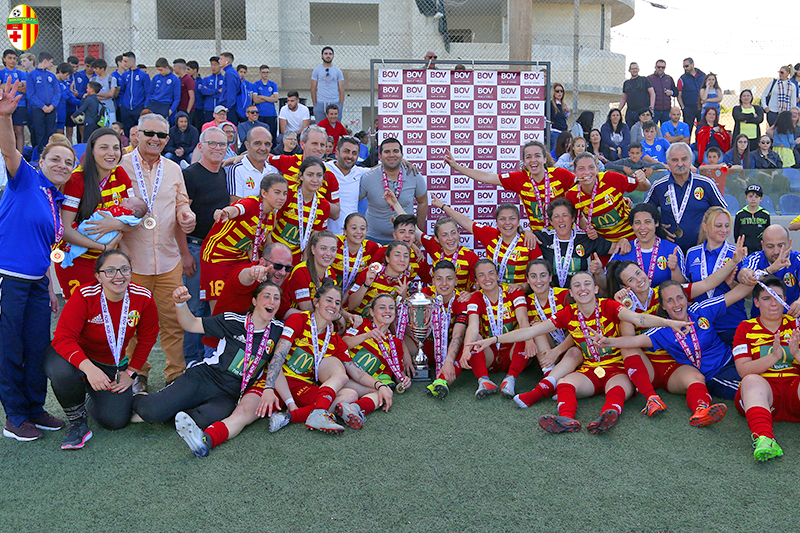
The unbeaten streak also progressed along an extraordinary time as the world dealt with the Covid-19 pandemic. Besides dealing with the obvious repercussions created by the stoppages in training, as well as the human toll of the pandemic, the restrictions imposed saw the Stripes’ hopes of a fifth straight title vanish in the 2020/21 season. This presented a different challenge to overcome, in the form of a psychological blow to the whole team.
The former coach, Melania Bajada, spoke about the struggle of being denied the chance to close out the league, “It was a difficult moment to accept, that we needed just a few points to win the league and were just four games away from the end of the season, with a clear lead and we were not awarded the title.”
Incidentally, the team’s final game that season was a 1-1 draw against Swieqi United. The Owls were on course for a famous victory thanks to Shona Zammit who put them ahead in the 67th minute, but they were denied by Ann-Marie Said’s leveler in the 88th minute.
Probed about that moment, Said responded, “It was quite euphoric to get the draw so late on, so I remember really celebrating with the team. At the time it meant that we got a point and kept the momentum going toward winning the title.” However, in hindsight the moment quickly turned to ash, “Although it ended counting toward extending the unbeaten streak, our target was always to win the league. So, I remember the elation in the moment, only to get to know some few weeks later that it was all for nothing.” This was a feeling echoed by many of the other players interviewed.
That draw marked the team’s thirteenth game of the league, one shy of completing more than three-fourths of the season, which would have made them eligible to be awarded the tenth title according to the rules. Probed about the feeling of having this taken out of their hands, Bajada was of the same frame of mind, “It was a moment where I felt that all the sacrifices that we did as a team were dismissed and unappreciated. The men’s league had been closed by then. I know there was a rule, but we could have played that game and the decision taken felt disrespectful toward women’s football.”
Probed on picking up the team following all of this, Bajada said, “It was not difficult to motivate the team to continue where we left off. Physically, of course, there were some players who kept up their physical training while others had stopped. However, we had our pre-season to get players back into shape. We perhaps struggled a bit in the UEFA Women’s Champions League because a lot of the professional teams kept training.”
The side returned to the local league with the needed determination. They finished the next season with 16 wins and 2 draws. In doing so, they bagged their fifth consecutive title, and tenth overall, while remaining unbeaten.
As the streak went on, so did the dynamics of the league evolve with different sides attempting to down the Stripes. Questioned about rivalries, Bajada said, “I think Mgarr United gave us a tough time each game and there were a few draws as well. However, I think on the day we managed to rise to the challenge.”
With time, the threat started to grow from Swieqi United, who ultimately delivered the blow this year. Speaking about the growth of the rivals, Bajada said, “They invested in players who are significant in the Maltese league, and they had a plan which we can see today is a positive in Maltese women’s football.”
In fact, when probed about moments where she felt that the streak could come to an end during her tenure, Bajada singled out her final league match in charge of the team, which was played against the Owls. “We were not playing our best and I remember going into the dressing room at half-time extremely angry, because I did not want to end my time with the team on such a bad note. However, the players rose to the occasion again (drawing 2-2). They did so again in the Knockout, which we won (3-0 against Swieqi United).”
The Pressure of An Unbeaten Streak
As five games turned into ten, and those turned into more, the reality of the streak started to set in. However, before setting sight on breaking a record, the Stripes needed to first equal the standing record of Hibernians, which stood at 69 matches unbeaten.
Speaking about navigating the pressure of the unbeaten streak, Melania Bajada said, “As a coach I knew about the streak, but never gave it too much importance. I never wanted to put any extra pressure on the players. My focus was the team was performing well, working towards winning matches and bringing home titles. That was enough.”
The attention kept increasing as the Stripes approached the standing record, but Bajada stood firm against diverting any unnecessary attention toward the team. “I remember I was asked to do an interview ahead of reaching Hibernians’ record. However, I refused to do it until we reached the streak, simply because I did not want to put any added pressure on the team, while also giving opponents an added motivation to beat us, more than simply to earn three points.”
Additionally, as teams consistently came up against the challenge of ending Birkirkara’s reign, there was no doubt that their football was scrutinised by their opponents. Probed about the tactical decision of focusing her team to play their style with consistency and high-level, against purposely tweaking the system to avoid being predictable, the Stripes’ former coach said, “In terms of coaching I made sure to keep strengthening the things that were working. I tried to make some changes but in cases where these did not work too well I avoided disrupting the rhythm and instead focus on improving the things which worked for the team.”
Building A Lasting Dominance
However, beyond the game-to-game approach, the coach also spoke of the development of the youth academy in being a crucial part of her plan to ensure the dominance lasted. “I was the head coach of the grassroots sector and I believed this to be a very important aspect. There was a strong foundation which I built on and there were instances where I changed games because I put in these young players on the pitch. So, I believe that is an extremely important thing to consider and that to build a lasting reign, there needs to be the effort put in from the grassroots level all the way to the senior team.”
On the flip side, it can be daunting to break into the senior team. Youth academy graduate Veronique Mifsud alluded to the importance of having the right environment. She said, “At the beginning I must admit I was a little bit anxious to play and train with the seniors. However, given that I wasn’t the only young player in training, as well as the welcoming environment I experienced from my teammates, I quickly adapted and felt at ease to perform with no pressure. I was also aware that I had to keep up with the constant level of the team, given that we fighting to stay at the top of the table.”
In fact, Mifsud also simultaneously captained the youth team toward titles as well, “I gained a lot of knowledge and experience from the senior team. Obviously, the youth team was a completely different environment and we had to face different challenges. As a captain I tried to implement the winning mentality as much as possible within the team, whilst keeping in mind that each team is different from another and has different qualities and attributes. Winning the league twice with the youths meant a lot to me, as it is a different kind of accomplishment from when you compare it with the seniors.”
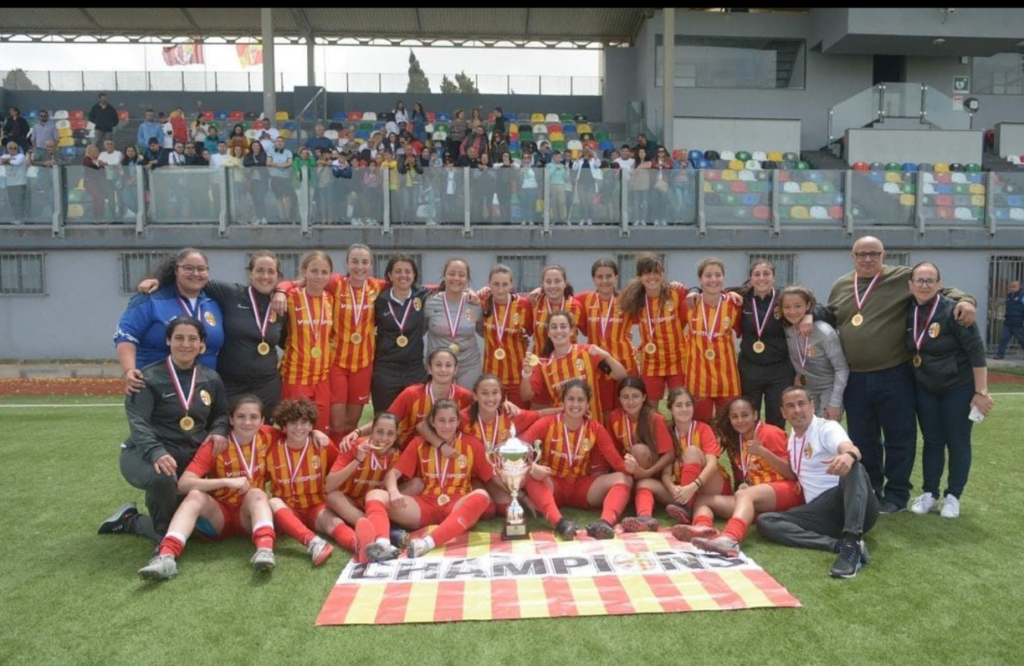
Pillars Amid Coaching & Squad Evolution
Besides the introduction of youth players, the club was also involved in the recruitment of a number of players. Amid this change, there were a few who undoubtedly carried the mantle of supporting all those arriving into the squad to learn the ropes and ensure that they understood the task at hand.
In fact, the side continued their unbeaten streak in the league after coach Melania Bajada left for more than a season, under the tutelage of Jose Borg and his technical staff. Probed about seeing that success continue after her tenure Bajada said, “I’m very proud of the fact that the team kept extending the success. One of my goals was to build a successful foundation because coaches cannot remain with a team forever, but I think it is important that you leave a team in a way that the person succeeding you can work with. I am now in a good environment where I found this myself and I am happy to have done the same in my work with Birkirkara.”
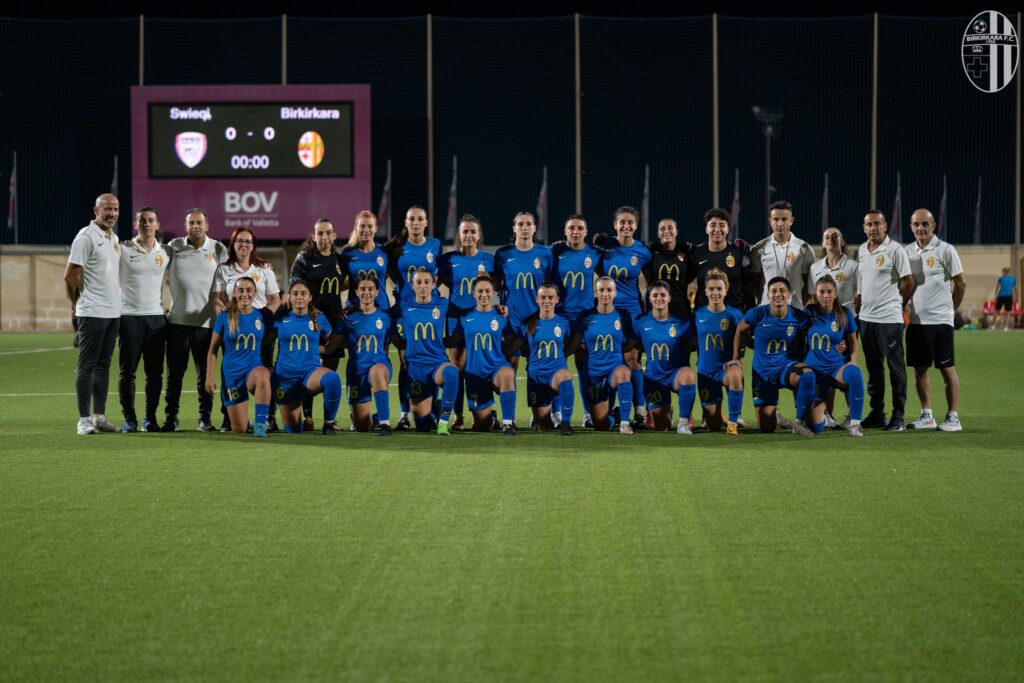
The former coach also praised the success achieved beyond the local league, “I was very happy to also to see the team earn two victories in the UEFA Women’s Champions League. It was one of the biggest dreams and sitting there watching as a supporter I was very happy to see them celebrate this success.”
Beaming with pride, Bajada concluded, “I know just how hard these women work and so I am proud to see they’ve continued growing, not just on the pitch but also in their personalities. It is not a success made from a few individual stars, but a group who together make a real team.”
The captain of the team, Stephania Farrugia, summed it up nicely, “Obviously this streak has stretched over multiple seasons. In that time, we have had different players, coaches and staff. Whilst the people have changed, the mentality has always remained the same; going out to every game without any complacency and the hunger to win. As captain the main role is to make sure that the standards expected and required by the club are kept up every day in training so that it can be shown on the pitch. Of course, the coaches and other senior players are also vital in ensuring that the performances are always of a consistently high level.”
The team conceded just 31 goals in the span of seven seasons. Goalkeeper Janice Xuereb was one crucial guardian and asked to identify reasons that led to this impressive defensive tally, despite the changes, she responded, “Yes, through the years we changed several defenders but our style of play and mentality always remained the same. We also always had a mixture of promising and experienced players. An additional thing is that our present back-four is also part of the national team. Having been together for several years and playing together with the national team allows us to get to know and understand each other much better. Obviously, the merit of keeping several clean sheets is to all thanks to the team, as our defensive line starts from the attackers.”
Speaking of attackers, the club also had a changing roster of front threats who contributed to the streak to go on as long as it did. One constant was Raina Giusti, who is the leading goalscorer for the club on the women’s side with more than 150 goals. Probed about her contributions to maintain the streak going, she said, “As a forward providing goals and assists is something that I work toward to grow as a player and in doing so continue to contribute to the team to achieve these milestones. In reference to the unbeaten streak of course the goals which help to get a draw or seal a late win are the most rewarding, but each goal has its own story. The streak may be over, but I look forward toward helping the team achieve more.”
Meanwhile, Alishia Sultana is another player who has been a great servant to the club along this time and someone who perhaps truly embodies the ‘never giving up’ attitude in every moment on the pitch. Probed on the importance of this mentality to avoid slipping into complacency in search of extending the streak, she responded, “The commitment to persist and fight until the very end serves as a constant wellspring of motivation. It not only instills a drive and energy to persevere but also ensures that, game after game, we maintain unwavering focus and never underestimate any opponent. Our primary goal is always to secure the three points in every match, considering everything else as secondary. While other aspects may be enjoyable, nothing outweighs the significance of consistently winning each game.”
The Streak-Ending Moment
Last year, current coach Jose’ Borg echoed Melania Bajada’s notion that Swieqi United had grown to be the team that gave the side most trouble. Like his predecessor, Borg was always reluctant to speak about the streak and also alluded to the fact that it had to be broken at some point. The challenge was to extend it in search of more silverware.
The team succeeded in lifting their sixth consecutive Assikura Women’s League title last year, in exactly the same way as the one before it, with 16 wins and 2 draws, still unbeaten in the league.
This year, more teams strengthened, but perhaps having laid the foundation earlier, the Owls were still in the best position to down the giant and executed it late in the first encounter between the two.
Probed about seeing that goal go in, Veronique Mifsud said, “Going into the game we were more focused on getting the win to lead the table rather than to keep the unbeaten streak going. As a player, it’s nice to form part of such an accomplishment together with my teammates. However, I am aware that football is an unpredictable game where anything can happen in ninety minutes. The game against Swieqi United was a well-balanced game which unfortunately resulted in a loss for us. Naturally, I was very disappointed with the loss in general. However, I believe it was an eye opener for us to work even harder and that the level in the league is increasing.”
Likewise, Alishia Sultana said, “At first, the main feeling was the disappointment of losing. After going 92 games without a defeat, the pressure and the need to consistently perform at our best became more challenging over time.” Birkirkara’s number nine continued, “Even though we eventually faced a loss, it didn’t stop us from shifting our focus to the next game. Swieqi’s goal came right at the end of injury time from a free kick, showing our team’s determination until the very last moments. The situation unfolded as it did, but it didn’t shake our determination to recover and keep pushing for success.”
Asked about the legacy of all the personnel involved to extend the streak up to 92, Jose Borg acknowledged the work of those before him as well as those who are in the trenches with him today. He said, “It is the fruit of a lot of people’s work, including coaches and technical staff who were here before me, and a committee who was here before too. Our aim was never to break a record, but it was always to win the league.”
The Future
As the league toughens, one wonders if such a dominant streak may ever be reached. However, the team does not seem to be too bothered about this.
Alishia Sultana perhaps best summed up the mentality the team is leading with, “The streak demonstrated that Birkirkara is a team with a winning history. While having this record is commendable, it doesn’t compare to the significance of securing league titles and trophies; those accomplishments signal the beginning of a challenging journey.”
Eyeing the current league campaign, she continued, “Now, with four teams competing to be the best and win the title, the path ahead is still challenging. Seeing our opponents and their fans happy about beating us reminds us of how important our past wins were. Winning 92 games is a big achievement, and I get why it meant a lot to them to break this streak. But we’re still motivated and we’re determined to keep moving forward.”
Coach Jose Borg echoed that there is only one target on the agenda, “The aim remains to win the league, irrespective of how it may come.”
Several players are currently on international duty with Malta, but the Stripes will return to action on the 8th December at the Centenary Stadium against San Gwann (16:30).
Lead Image: Chiara Faedo
Stay up to date by following The Sporting Fan on social media: Instagram ~ Facebook ~ X

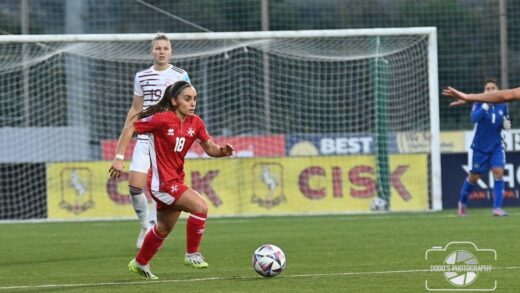
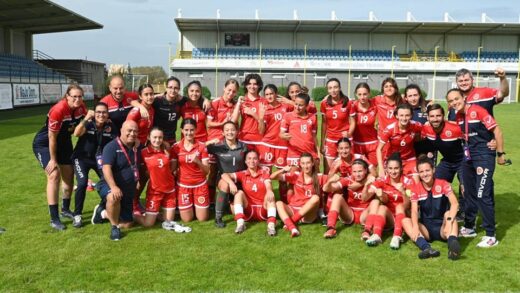
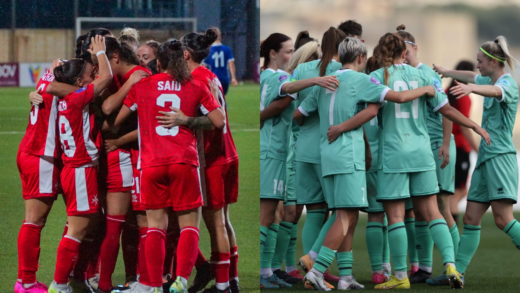
3 Responses
[…] Swieqi managed to back that up with a dramatic late win against Birkirkara in the league, ending Birkirkara’s 7-year running unbeaten streak in the competition. The two had a goalless stalemate the second time round. However, Birkirkara pipped Swieqi United […]
[…] United dealt the first defeat of the campaign with a late goal. It also marked the end of the unbeaten streak in the league, which had lasted across seven seasons. However, the Stripes held on to a goalless […]
[…] making another step forward in European football, Birkirkara took a hit in losing their unbeaten streak in the league in November. However, the Stripes soaked the pressure and rose to the occasion by […]